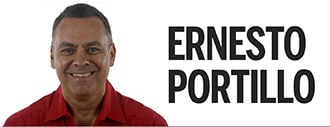It was a few minutes before noon when Laurie Starr felt the “skin of the earth” roll under her feet.
Her initial sensation was that she was surfing. Then she and others around her ran.
“It felt like we were at the epicenter,” Starr said.
The Tucson resident was in Nepal last week when a 7.8 magnitude earthquake violently shook the landlocked South Asian country. It is thought to have killed more than 6,200 people, a number that continues to climb, and injured twice as many.
Starr, who returned home on Wednesday, was in the Sindhuli district, about 90 miles outside of the capital city of Kathmandu. She returned reluctantly, torn between wanting to stay to help and the reality that she didn’t have the needed skills to dig people out from the rubble or tend to their injuries.
“I was going to take more than I could give,” Starr said Friday while we talked in her Armory Park home.
She was in Nepal for about a week before the giant quake struck. Coincidentally, Starr was in the country working on a program on how people there respond to quakes and how they can recover. Nepal, squeezed between India and Tibet, suffers from earthquakes.
Starr is a senior technical adviser with Tango International, a local firm that provides technical assistance and program evaluations for non-government organizations working in relief and development around the world. It was her second visit to Nepal.
Before the quake erupted, Starr was with a Nepali team in a small village, primarily filled with wooden structures, waiting for residents to join them for a community meeting.
When the first wave reached them, Starr didn’t realize it. But the residents immediately knew that it was an earthquake.
“We all ran into an open field,” she said. Then everything went crazy, she added.
The earth felt angry. Aftershocks followed, including a quake with a 6.7 magnitude the following day.
Starr, who in her eight years with Tango has traveled to Africa and Asia, and was in Nepal a year ago this time, had never experienced a natural disaster. In the aftermath confusion and fear filled everyone.
As she listened to news reports, it became clear how strong the quake was and the damage it caused.
Surprisingly, her cellphone had service — spotty, but she received calls, including one from a co-worker who was about 900 miles away in Pakistan and who had felt the earthquake.
A day after the temblor, Starr traveled to Kathmandu, several long hours away. As she approached the edge of the city, she saw the extent of the destruction. Houses had turned into dust, she said.
But in the city, vast swaths of Kathmandu were untouched, she said.
“We were surprised,” she said. “We thought we were coming to a flattened city.”
Still, the earthquake left many dead and many more homeless. Homes, buildings, and several UNESCO World Heritage sites, including the 100-foot Dharahara Tower, were destroyed.
The rolling aftershocks kept people from venturing inside homes and buildings. People slept outside. Starr camped outside her hotel.
She thought about staying but it became apparent that she needed to evacuate. There wasn’t much she could do, she concluded.
That decision left her feeling guilty.
But she expects to return to Nepal, with no trepidation. She wants Tucson not to forget Nepal as its people begin the long and arduous road to recovery. Long after the media leaves, Starr said, the Nepalese will be struggling to rebuild.
They will still need our help and attention months from now.
Starr suggested that people who want to donate money to aid organizations should take some time and research possible groups. Give to groups that are working in Nepal, and groups that have specific plans and targets.
She suggested Save the Children, CARE and Groundswell International.
And she’s already found a personal and direct way to help.
The night she returned to Tucson after a long flight from Hong Kong, she stopped at a convenience store near her home. While paying the cashier she realized the clerk was from Nepal.
They quickly exchanged information. The clerk told Starr that his family was unhurt. Starr told the clerk where she had been and what she saw.
“We must have talked for 20 minutes,” she said.
That 20 minutes is likely to turn into a long friendship, she said. When she returns to Nepal, she hopes to be able to take needed items to the clerk’s family.
“There was a reason I stopped there to buy something I didn’t need,” she said.





